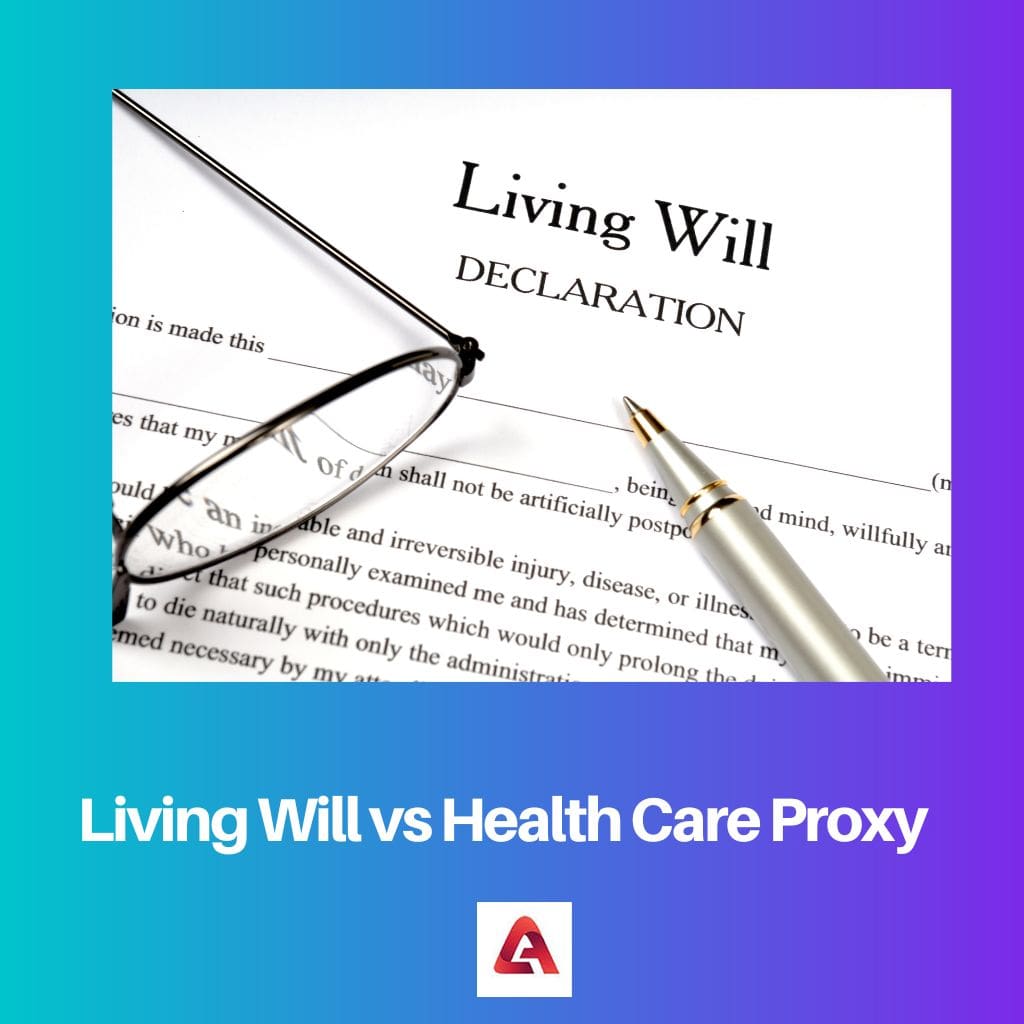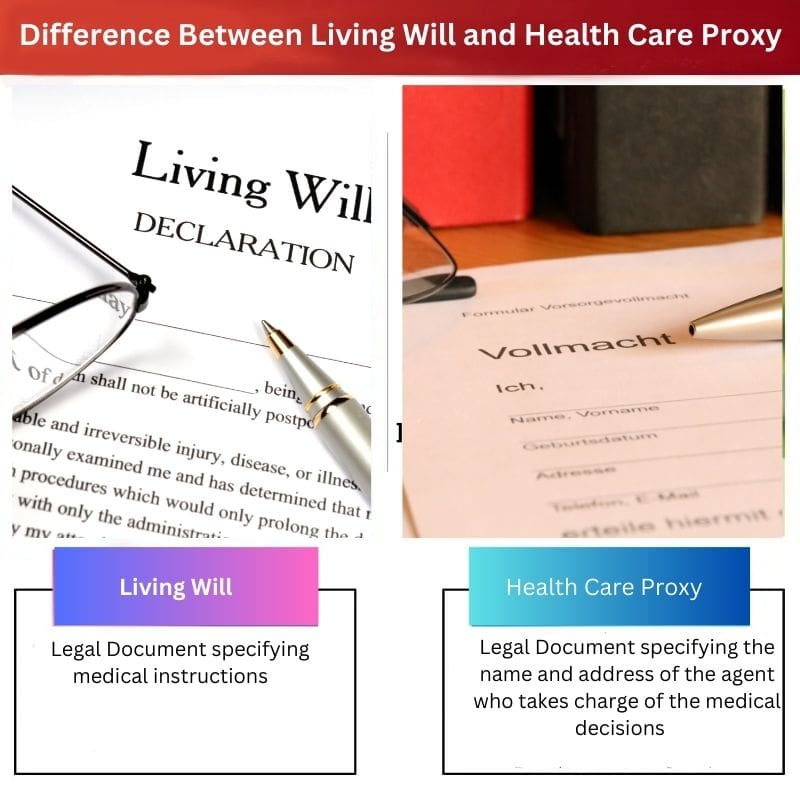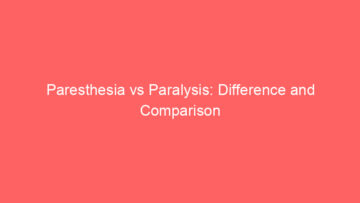Advance Healthcare Directives is a wide category of legalized documents that aid when patients are not able to make medical decisions on their own due to their illness. It majorly consists of two subtypes, Living Will and Health Care Proxy.
Both are documents but are different in their own way.
Key Takeaways
- A living will is a legal document that outlines an individual’s medical treatment preferences if incapacitated.
- A healthcare proxy is a person appointed by an individual to make medical decisions on their behalf when they cannot do so themselves.
- A living will focus on specific medical treatments, whereas a healthcare proxy involves appointing someone to make broader healthcare decisions.
Living Will vs Health Care Proxy
Lliving will is a legal document used in end-of-life care that outline a person’s wishes regarding medical treatment and interventions, while a health care proxy is a legal document that appoints a designated person to make medical decisions on their behalf in case they are incapacitated.

Living Will is a document that is formulated when a patient wants his/ her treatment to go on but they are not in a state to command or make decisions or provide instructions, so they formulate every detail in this document and submit it to the hospital who then proceed with the treatment based on the details provided in the Living Will.
On the other hand, a Health Care Proxy, as the name suggests is a Proxy appointed by the patient through a legal document to look after their treatment.
These agents take medical decisions on the behalf of the patient and support their treatment until the patient is good enough to make their own decisions.
Comparison Table
| Parameters of Comparison | Living Will | Health Care Proxy |
|---|---|---|
| Definition | Legal Document specifying medical instructions | Legal Document specifying the name and address of the agent who takes charge of the medical decisions |
| Originated in | Chicago (Luis Kutner) -1967 | Virginia- 1954 |
| Descriptions and Conditions | The course of Treatment, Mode of Treatment, Clear Instructions regarding medical diet, etc. | Name, Address, Qualification of the agent, details about an alternate agent, Duration of the appointed agent, etc. |
| Specifications | Patient’s wish to be fed via tubes, hydration, use of ventilators, etc. | Organ donation instructions, instructions specifying the patient’s wish to undergo treatments like blood transfusion, allergies concerned with the patient, etc. |
| Also referred to as | Advance Directive | Medical Power of Attorney |
What is a Living Will?
As mentioned above, a Living Will is a type of an Advance Directive that comes into force when a patient is in a state where he/ she is physically or mentally not in a state to make medical decisions on their own.
They provide a legal document mentioning the course and mode of their treatment, and several other specific instructions. The instructions need to be clear and specific as they are the only source that will be followed by the Health Care professionals.
Living Will originated back in the 1960s-1970s based on an Estate Will- that conveys messages related to the property that you possess when you are no longer able to function properly.
Similarly, a Living Will was invented to convey the medical requirements of a patient. Since this type of Will comes into use when a patient is alive it is termed as ‘Living Will’.
It contains information about the duration and mode of treatment, it may also contain the information about forbiddance of some heavy procedures on the patient.
It will also contain details about the mode of intake of food through tubes, use of heavy reliable systems like ventilators, etc.
Living Will is of two types- Specific and General.
As the name suggests a Specific Living Will is highly specific, may contain information like medical diet, pain relief medicines, specific allergies related to the use of some antibiotics, or regarding the administration of anesthesia, etc.
Whereas a General Living Will consists of one main statement which denotes that the doctors should follow these instructions when the patient is no longer in a stable state. A General Living Will has no specifications whatsoever.
Living Wills are quite popular in the United States and are widely used in other parts of the world as well. Thus, a Living Will if perfectly formulated can save the lives of many miserable patients.
The only shortfall of a Living Will is that it needs to be updated frequently by considering the opinions of various doctors.
What is a Health Care Proxy?
Aforementioned, a Health Care Proxy is an agent appointed by the patient who looks after all the decisions, requirements related to the treatment if the patient is not in a stable physical and mental state to make decisions.
The agent makes decisions till the patient is partially recovered or is in a stable state good enough to make decisions.
Health Care Proxy originated from the Durable Power of Attorney which is concerned with property and estate and provides authority to another person when the person in charge is in no state to make decisions.
Similarly, Health Care Proxy is a Medical Power of Attorney which transfers the authority to someone else when the patient is not stable.
The format of a Health Care Proxy varies from country to country or even in some states but the common/ basic format includes personal details about the agent, details or contact details of an alternate agent if the concerned agent is not available, the signature of the patient, duration of treatment, witness signatures, etc., and a lawyer to legalize and attest the documents.
Some Health Care Proxies may also contain special instructions regarding the wish of the patient to accept or reject some medical procedures like blood transfusion, some scans, surgeries, dialysis, etc.
Instructions regarding organ donation at the time of death should also be mentioned.
The agent can be anyone related by blood to the patient, someone trustworthy is expected. Some countries have specified that no one related to the medical community right from the administrator to a mere doctor can turn up as an agent.
Some countries also cancel the document if the agent (blood-related) is now separated from the patient, e.g., Divorce from the partner, or if the patient registers another Health Care Proxy which is updated and latest.
Though anyone above 18 years can turn into an agent for a needy patient.
Main Differences Between Living Will and Health Care Proxy
- Living Will is a legal document containing all the needy information concerned with the treatment formulated when a patient is not able to make decisions, while a Health Care Proxy is a document stating the appointment of an agent who will take decisions on behalf of the patient.
- Living Will originated from Estate Wills while Health Care Proxy originated from Durable Power of Attorney.
- Living Will may be specific or general while Health Care Proxy is almost the same in every country with some modifications or specifications.
- Living Will may contain specifications like the patient’s will regarding mode of food, hydration, special treatments, etc., while Health Care Proxy contains specifications like the mention of organ donation, medical procedures, etc.
- Living Will is modified only by the patient, on the other hand, Health Care Proxy may be modified by the agent or the patient can even permit the appointment of an alternate agent in case the appointed agent is unable to follow the instructions.





